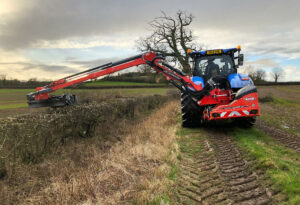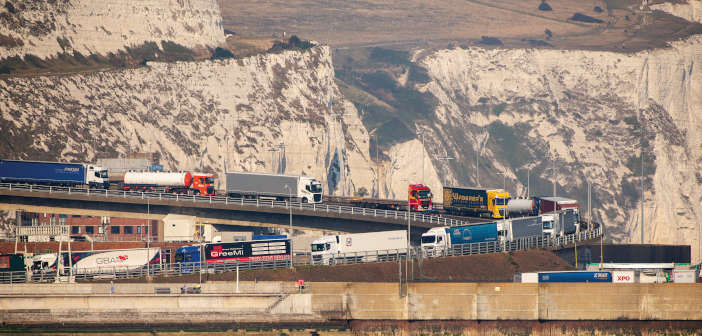As we start the year separated from the European Union, the AEA’s Stephen Howarth examines how imports and sales of agricultural machinery could be affected.
At the time of writing, the outcome of the UK’s negotiations with the EU about the future trade relationship was still unknown. In truth, though, any deal would make little difference to the machinery industry in the short-term. Longer-term, the implications for agriculture will, of course, be a big deal for the machinery industry. Until then, though, most changes that we face will happen regardless of any deal, as Great Britain (but not Northern Ireland) will be leaving the EU’s Customs Union and Single Market.
The most immediate change will come from the introduction of a customs border between Great Britain and the EU. That means a raft of extra paperwork for anyone moving machinery across the English Channel or the Irish Sea. Most major machinery companies are ready for the new requirements. They are used to shipping machines all around the world anyway, so customs procedures are nothing new, although many UK subsidiaries have been up a steep learning curve. There will be some extra costs involved, of course, which may eventually mean higher prices, although most companies are likely to absorb them in the short-term. Fortunately, most farm equipment will not face any import tariffs, even in the absence of a trade deal, although some parts would. That means price rises should not be too dramatic, although currency movements could have an effect.
Given that the paperwork is generally in hand, the biggest concern about customs is the risk of increased delays at the border. Most machinery and parts enter Great Britain on trucks via the ‘Short Straits’ (Dover to Calais or the Channel Tunnel). If these lorries are stuck in queues for long periods, it could delay the delivery of goods to the end-user. For finished machines, that might be a headache but shouldn’t be that serious. More problematic will be the effect on ‘just in time’ supply chains and on the delivery of spare parts.

Most manufacturers aim to deliver replacement parts to customers within 24 hours, particularly at key times of the year. Often these parts are delivered direct from the factory, rather than from stores in the UK. That timescale won’t be possible if those parts are stuck in a queue of lorries for 48 hours, the government’s worst-case scenario. Fortunately, January is a quiet period for the urgent delivery of spare parts, so we will be hoping that queues will be shorter by the spring, allowing goods to flow more freely. Manufacturers have contingency plans in place in case they aren’t but delays are still possible.
Worries about cross-border transport are compounded by uncertainty about how many hauliers will be able to operate across the Channel. UK hauliers will lose the automatic right to operate in the EU, as will EU hauliers in the UK. A temporary solution will probably be found, as would have been the case had we left the EU without a deal last year, but that isn’t guaranteed. EU hauliers may also be reluctant to come to the UK if they are going to be stuck in a lengthy queue getting out again.
The other big concern as things stand relates to exports of used machinery (the rules will also affect imports of used machinery but these are much more limited). There are two problems, here. The first is that machinery ‘placed on the EU market’ for the first time must comply with current EU regulations. As technical standards often move on rapidly, particularly around engine emissions, many machines which are more than a year or two old won’t comply with the latest standards. It’s not clear whether this requirement will apply to machines that are already in use in the UK (we think it won’t but haven’t been able to get anyone to give us a definitive answer) but it will certainly cover any which are placed on the market here from the start of next year. Either way, the rule has the potential to severely curtail the export trade.
This isn’t the only issue for used machinery exports either. Any machinery which has been used for agricultural or forestry purposes must be accompanied by a phytosanitary certificate when imported into the EU. This is to confirm it has been inspected and is free of soil and plant material, so avoiding the risk of carrying any plant disease. This applies to machines from GB from the start of 2021. These certificates take time to obtain and carry a significant cost. There are also concerns about the capacity of the authorities involved to deal with the surge in inspections which will be needed. The level of awareness among businesses involved in the trade is probably also low.

Given that these rules cover sales to Northern Ireland (as it will be covered by EU regulations), the impact could be serious. We estimate at least £150-200 million of used machinery is exported to the EU each year, with up to 10,000 machines involved. These machines would need to find a home in Great Britain. Inevitably, that would mean lower second-hand prices and, hence, lower trade-in values. That would, of course, have a knock-on effect on the market for new machinery, particularly tractors and other mobile machinery. That means a hit to the machinery industry (perhaps up to £400 million) but also has implications for the productivity and environmental impact of UK agriculture, as farmers hold on to older, less efficient machines for longer.
Further down the line, the industry will face other changes, such as the replacement of the familiar CE mark with a new UKCA mark. That is being phased in between now and the start of 2023, though, so shouldn’t make much difference to machinery users. Machinery businesses will also face a raft of other changes which affect all companies, around data protection and employment of EU workers, for example. While these will create administrative challenges, they shouldn’t have a dramatic effect on the market either.
At the end of the day, these changes will have an effect on the farm machinery industry but we’ve been through periods of change before. While we may not come through unscathed, we know the industry will survive and thrive, so long as the demand is still there from farmers.


